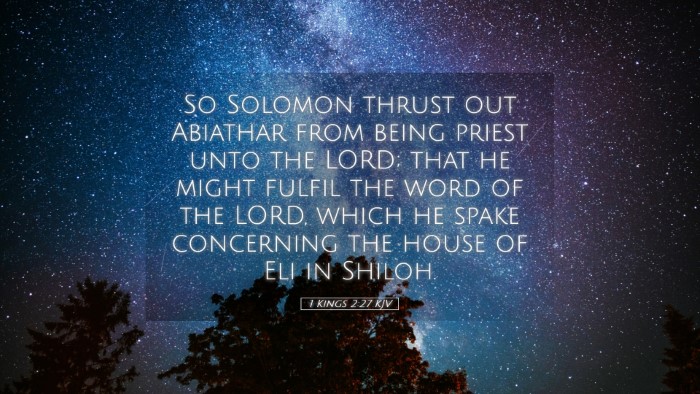Commentary on 1 Kings 2:27
Bible Verse: "So Solomon expelled Abiathar from being priest unto the LORD; that he might fulfil the word of the LORD, which he spake concerning the house of Eli in Shiloh." (1 Kings 2:27, KJV)
Introduction
This verse marks a significant turning point in the narrative surrounding the reign of Solomon, particularly concerning the priesthood and the prophetic word concerning Eli’s house. The expulsion of Abiathar, a priest and a son of Eli, reflects the fulfillment of God's judgment pronounced against Eli's lineage as depicted in 1 Samuel 2:30-36. This commentary synthesizes insights from notable public domain commentaries to elucidate the theological and historical implications of this event.
Contextual Background
The events leading up to this moment involve political and spiritual dynamics within Israel. Solomon has recently assumed the throne following the death of his father, David. The heavenly mandate upon David's line is reaffirmed, and yet, the priestly class must be aligned with the new king to ensure stability and divine favor.
- Abiathar’s Role: Abiathar was initially a loyal supporter of David during his reign, serving as a high priest and the only survivor of the massacre at Nob (1 Samuel 22:20-23). His presence at Solomon's court symbolizes a bridge between the eras of David and Solomon.
- The Prophecy Against Eli: The prophetic judgment against Eli (1 Samuel 2:30-36) indicates that God would remove his lineage from the priesthood. Abiathar's expulsion is seen as the divine fulfillment of this prophecy.
Theological Significance
The expulsion of Abiathar from the priesthood is pivotal for understanding God’s sovereignty and His commitment to holiness within His covenant community. Throughout biblical history, God has consistently upheld His promises and judgments, and this event highlights that He remains active in directing the affairs of His people.
- Continuity of Prophetic Fulfillment: The narrative demonstrates the importance of adhering to God's word. Solomon’s action resonates with the theme of divine retribution and demonstrates the seriousness with which God regards covenant disloyalty.
- Establishment of Legitimate Authority: Solomon’s decision to expel Abiathar the priest complements his consolidation of power. It signifies a fresh start, as he roots out those who opposed his legitimacy as king.
- Divine Judgment and Mercy: While Abiathar is punished, his life is spared. This aspect of the narrative also emphasizes God’s mercy, as he provides opportunities for repentance even amidst judgment.
Commentary Insights
Matthew Henry
Henry remarks on the sobering reality of divine judgment as seen in the expulsion of Abiathar. He emphasizes that Solomon’s act underscores God’s overarching sovereignty, and that leaders must be mindful of their alignment with divine will. He also attributes Abiathar’s downfall to his heart's disloyalty to the king, illustrating that spiritual leadership requires fidelity not only to God but also to the divinely appointed authority.
Albert Barnes
Barnes provides a thorough analysis of the historical significance of this moment, noting that Abiathar’s removal not only fulfills the prophecy concerning Eli but also serves as a cautionary reminder of the costs of straying from faithfulness. He highlights the political ramifications of Solomon’s action, as it sets a precedent for future interactions between the monarchy and the priesthood. Barnes accentuates the themes of divine justice and the necessity for leaders to be attuned to God’s expectations.
Adam Clarke
Clarke delves into the implications of Abiathar’s priesthood being cut off, noting the stark nature of the judgment pronounced upon Eli’s house. He articulates how this expulsion symbolizes the end of an era marked by compromise and the ascendancy of a new phase in Israel's spiritual governance. Clarke encourages readers to reflect upon the weight of disobedience and the grave consequences that can follow when leaders fail to uphold their duties before God.
Practical Applications
For modern-day pastors, theologians, and scholars, this passage offers deep reflections on leadership, accountability, and divine expectation:
- Leadership Integrity: Faithful leaders must ensure that their actions align with scriptural truths and God’s directives, recognizing the weight of their authority.
- Covenantal Faithfulness: The expulsion of Abiathar serves as a metaphor for the necessity of remaining faithful to God’s covenant, emphasizing the serious nature of spiritual and communal commitments.
- Response to Prophetic Voice: The narrative reminds us of the importance of heeding God’s warnings and aligning our lives with His prophetic messages, invoking a spirit of humility before divine judgment.
Conclusion
The account of Solomon expelling Abiathar from the priesthood in 1 Kings 2:27 serves as a profound narrative intertwining themes of divine judgment, leadership integrity, and the fulfillment of God's sovereign prophetic word. By understanding this scripture, contemporary leaders and scholars can draw lessons about accountability and the vital importance of fidelity to both God and the community they are called to serve. Thus, this passage reverberates through generations, urging a reflection on the implications of faithfulness in leadership.


